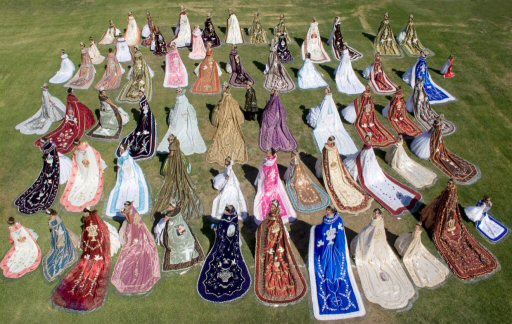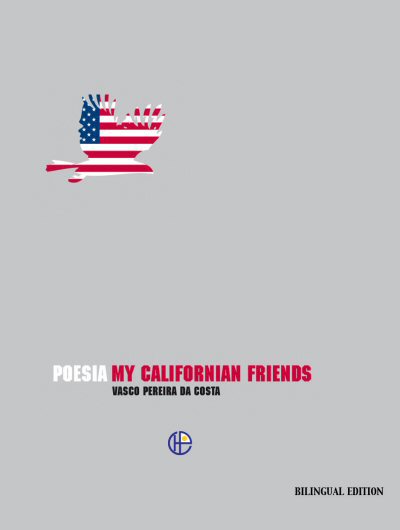
From Portuguese Heritage Publications of California
Expanded English-Portuguese bilingual edition
MY CALIFORNIAN FRIENDS: POETRY
Translated by Katharine F. Baker and Diniz Borges
Commentary
Rose was Rosa’s name
(translated by Diniz Borges)
Mother said no more
no more I no more you daughter
no more names in the rocks of the wharf
no more the island’s curtain.
No more Rosas you shall be Rose now
no more mist purpled sighs
no more will-o'-the-wisp
nor more the island no more
Still Rose didn't want the no more
and wanted to see the island of the no more
the purpled unhappy curtain
the names in the rocks of the wharf
She took herself and left.
No more Rose. Rosa again now.
Queen Nancy
(translated by Katharine F. Baker and
Diniz Borges)
Lord Holy Ghost of Whom I am a Brother
of Your Fraternity at Desterro. Bless
the abundance of the Californias – the meat the wine the bread
offered in the name of Your Terceira in the person
of this Queen of Atlantic festivities. Grasp
the altered code the silver tray the scepter the crown
the red vastness of her cape that is spread out on the pavement
the sequins the plumes the rhinestones in her crown
although You may be reminded of gaudy movie sets.
Rain down in tongues of flame Your wisdom
upon Nancy ephemeral Queen of the Holy Ghost
in the consecration of the Promised Land of Happiness.
Reveal the full marvel and the supreme awe
of the triangle the circle the square and the mystery
of Your banner embroidered in flame-red and gold
and the enigmas written on the altar of Your Empire.
Accept that Nancy Queen just for today represents
in the pure wine in the white bread in the bull’s blood
Eleusis’ secret meanings wakened anew.
Receive the Queen of Your day of Your people.
In human truth I tell You she is the people
who crossed oceans and lands in a metal bird
all the way to the Pacific in search of genuine happiness.
Lord Holy Ghost protect this schoolgirl
her terrestrial pronouncements her maritime syntax.
Bestow Your blessing on her adolescent beauty
her graceful sway her smile her feminine perfection.
Above all relieve her pinched feet. Be not
penitent
but on this day keep the gentlewoman
full of grace with You may she be blessed amongst women
for Nancy is Juno Gæa Mary Venus Maia Ceres.
Refresh with Your divine breath her overheated breast
may she not be bothered by perspiration or the weight of her regalia
may a light breeze touch her like a loving wind
entwine the ripe fruit that is offered on the foliage.
O Holy Ghost of Whom I am a Brother
of Your Fraternity at Desterro. I know that You will watch
over Nancy. But make the daughters in the Coronation
always sing the Paraclete and the Jubilo of life. Understand
in Your infinite wisdom attempt to grasp their language
Holy Ghost my brother my Californian friend.
Rose era o nome de Rosa
A mãe disse não mais
não mais eu não mais tu filha
não mais nomes na pedra do cais
não mais o cortinado da ilha
Não mais Rosa seja Rose agora
não mais névoas roxos ais
não mais a sorte caipora
não mais a ilha não mais
Porém Rose o não mais não quis
e quis ver a ilha do não mais
o cortinado roxo infeliz
os nomes na pedra do cais
Pegou em si e foi-se embora.
Não mais Rose. Rosa outra vez agora.
Queen Nancy
Senhor Espírito Santo de
Quem sou Irmão
da Tua Irmandade do Desterro. Abençoa
a abundância das Califórnias – a carne o vinho o pão
ofertados em nome da Tua Terceira na pessoa
desta Rainha de festejos atlânticos. Entende
o alterado código a salva o ceptro a coroa
o vasto vermelho do manto que no asfalto se estende
as lantejoulas os penachos os vidrilhos do diadema
ainda que Te lembrem adereços grotescos de cinema.
Desce em línguas de lume a Tua sabedoria
sobre Nancy efémera Rainha do Espírito Santo
na sagração da prometida Terra da Alegria.
Revela a plena maravilha e o supremo espanto
do triângulo do círculo do quadrado e o mistério
da Tua bandeira bordada a fogo e a oiro
e os enigmas inscritos no altar do Teu Império.
Aceita que Nancy só hoje Rainha represente
no puro vinho no alvo pão no sangue do toiro
os secretos sentidos de Elêusis desperto de novo.
Acolhe a Rainha do Teu dia da Tua minha gente.
Em humanal verdade te digo ela é o povo
que cruzou mares e terras num pássaro de metal
até ao Pacífico em busca da felicidade legítima.
Protege Senhor Espírito Santo a rapariga gramatical
seus enunciados terrunhos a sua sintaxe marítima.
Lança a Tua bênção à sua beleza de adolescente
seus meneios seu sorriso sua perfeição feminil.
Sobretudo alivia seus pés apertados. Não seja penitente
mas que neste dia permaneça a mulher gentil
cheia de graça Contigo seja bendita entre as mulheres
pois Nancy é Juno Gea Maria Vénus Maia Ceres.
Refresca com Teu sopro divino seu colo acalorado
não a importune o suor nem o peso da roupagem
e que uma leve brisa a toque como o vento namorado
enleia o fruto maduro que se oferece na folhagem.
Senhor Espírito Santo de Quem sou Irmão
na Tua Irmandade do Desterro. Sei que velas
por Nancy. Mas faze com que as filhas em coroação
cantem sempre o Paráclito e o júbilo da vida. Entende
na Tua sabedoria infinda procura perceber a língua delas
Holy Ghost my brother my Californian
friend.
Rose was Rosa’s name
(translated by Diniz Borges)
Mother said no more
no more I no more you daughter
no more names in the rocks of the wharf
no more the island’s curtain.
No more Rosas you shall be Rose now
no more mist purpled sighs
no more will-o'-the-wisp
nor more the island no more
Still Rose didn't want the no more
and wanted to see the island of the no more
the purpled unhappy curtain
the names in the rocks of the wharf
She took herself and left.
No more Rose. Rosa again now.
Queen Nancy
(translated by Katharine F. Baker and
Diniz Borges)
Lord Holy Ghost of Whom I am a Brother
of Your Fraternity at Desterro. Bless
the abundance of the Californias – the meat the wine the bread
offered in the name of Your Terceira in the person
of this Queen of Atlantic festivities. Grasp
the altered code the silver tray the scepter the crown
the red vastness of her cape that is spread out on the pavement
the sequins the plumes the rhinestones in her crown
although You may be reminded of gaudy movie sets.
Rain down in tongues of flame Your wisdom
upon Nancy ephemeral Queen of the Holy Ghost
in the consecration of the Promised Land of Happiness.
Reveal the full marvel and the supreme awe
of the triangle the circle the square and the mystery
of Your banner embroidered in flame-red and gold
and the enigmas written on the altar of Your Empire.
Accept that Nancy Queen just for today represents
in the pure wine in the white bread in the bull’s blood
Eleusis’ secret meanings wakened anew.
Receive the Queen of Your day of Your people.
In human truth I tell You she is the people
who crossed oceans and lands in a metal bird
all the way to the Pacific in search of genuine happiness.
Lord Holy Ghost protect this schoolgirl
her terrestrial pronouncements her maritime syntax.
Bestow Your blessing on her adolescent beauty
her graceful sway her smile her feminine perfection.
Above all relieve her pinched feet. Be not penitent
but on this day keep the gentlewoman
full of grace with You may she be blessed amongst women
for Nancy is Juno Gæa Mary Venus Maia Ceres.
Refresh with Your divine breath her overheated breast
may she not be bothered by perspiration or the weight of her regalia
may a light breeze touch her like a loving wind
entwine the ripe fruit that is offered on the foliage.
O Holy Ghost of Whom I am a Brother
of Your Fraternity at Desterro. I know that You will watch
over Nancy. But make the daughters in the Coronation
always sing the Paraclete and the Jubilo of life. Understand
in Your infinite wisdom attempt to grasp their language
Holy Ghost my brother my Californian friend.
Rose era o nome de Rosa
A mãe disse não mais
não mais eu não mais tu filha
não mais nomes na pedra do cais
não mais o cortinado da ilha
Não mais Rosa seja Rose agora
não mais névoas roxos ais
não mais a sorte caipora
não mais a ilha não mais
Porém Rose o não mais não quis
e quis ver a ilha do não mais
o cortinado roxo infeliz
os nomes na pedra do cais
Pegou em si e foi-se embora.
Não mais Rose. Rosa outra vez agora.
Queen Nancy
Senhor Espírito Santo de
Quem sou Irmão
da Tua Irmandade do Desterro. Abençoa
a abundância das Califórnias – a carne o vinho o pão
ofertados em nome da Tua Terceira na pessoa
desta Rainha de festejos atlânticos. Entende
o alterado código a salva o ceptro a coroa
o vasto vermelho do manto que no asfalto se estende
as lantejoulas os penachos os vidrilhos do diadema
ainda que Te lembrem adereços grotescos de cinema.
Desce em línguas de lume a Tua sabedoria
sobre Nancy efémera Rainha do Espírito Santo
na sagração da prometida Terra da Alegria.
Revela a plena maravilha e o supremo espanto
do triângulo do círculo do quadrado e o mistério
da Tua bandeira bordada a fogo e a oiro
e os enigmas inscritos no altar do Teu Império.
Aceita que Nancy só hoje Rainha represente
no puro vinho no alvo pão no sangue do toiro
os secretos sentidos de Elêusis desperto de novo.
Acolhe a Rainha do Teu dia da Tua minha gente.
Em humanal verdade te digo ela é o povo
que cruzou mares e terras num pássaro de metal
até ao Pacífico em busca da felicidade legítima.
Protege Senhor Espírito Santo a rapariga gramatical
seus enunciados terrunhos a sua sintaxe marítima.
Lança a Tua bênção à sua beleza de adolescente
seus meneios seu sorriso sua perfeição feminil.
Sobretudo alivia seus pés apertados. Não seja penitente
mas que neste dia permaneça a mulher gentil
cheia de graça Contigo seja bendita entre as mulheres
pois Nancy é Juno Gea Maria Vénus Maia Ceres.
Refresca com Teu sopro divino seu colo acalorado
não a importune o suor nem o peso da roupagem
e que uma leve brisa a toque como o vento namorado
enleia o fruto maduro que se oferece na folhagem.
Senhor Espírito Santo de Quem sou Irmão
na Tua Irmandade do Desterro. Sei que velas
por Nancy. Mas faze com que as filhas em coroação
cantem sempre o Paráclito e o júbilo da vida. Entende
na Tua sabedoria infinda procura perceber a língua delas
Holy Ghost my brother my Californian
friend.
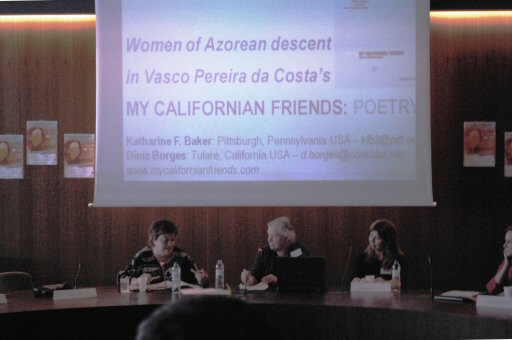
Co-translator Katharine Baker (c.) presenting talk in Paris, 11 May 2011.
– Photo by John Baker
KATHARINE F. BAKER AND DINIZ BORGES: “Women of Azorean Descent in Vasco Pereira da Costa’s My Californian Friends: Poetry.” Excerpted from a paper presented by Katharine Baker at the 5th International Colloquium, “The Voice and Choice of Portuguese Women in the Diaspora in France and Elsewhere," Université Paris Ouest – Nanterre La Défense, 11 May 2011.
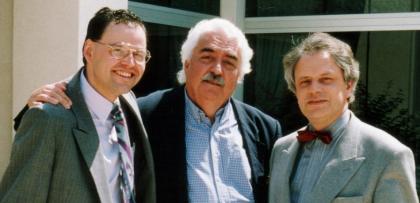
Co-translator Diniz Borges (l.) and poet Vasco Pereira da Costa (r.) with poet Emanuel Félix (c.), at the Threads of Atlantic Heritage literary symposium in Tulare, California, 1992.
– Photo courtesy Diniz Borges
From 1990 to 2002, annual Portuguese literary symposiums called Filamentos da Herança Atlântica [Threads of Atlantic Heritage] were held in Tulare, California, for the purpose of bringing prominent Azorean and Azorean-American writers together with North Americans, especially those of Portuguese descent. In advance of the 1998 event, chair Diniz Borges challenged each invited writer to compose a poem to bring for the occasion on some aspect of Azorean-American life.
To Diniz’ amazement, native-Terceiran Vasco Pereira da Costa brought a whole sheaf of original poetry dedicated to friends made during previous visits to California for these symposiums. The collection became the basis for Vasco’s 1999 book My Californian Friends: Poesia, published by Gávea Brown in Providence, Rhode Island, and Palimage Editores of Viseu, Portugal. In 2009, Portuguese Heritage Publications of California published a bilingual edition, with English translations by Diniz Borges and me.
Two of the poems in My Californian Friends depict composite Azorean-American young women who are polar opposites in attitude toward life in California. The first poem, "Rose Was Rosa’s Name" – translated by Diniz Borges for his 2003 bilingual anthology On a Leaf of Blue – presents an immigrant family who came from the Azores, doubtless in hopes of a better life. The mother, with likely the best of intentions, strove to make her daughter more American (even anglicizing her Portuguese name Rosa into Rose) – but the daughter, consumed by saudades, rejects her mother’s efforts, declaring she will resume her Portuguese name and return to the Azores. The poem’s words yield no clue as to whether mother and daughter are sad and depressed over their impasse, or angry and resentful toward one another. Also unanswered is whether Rose/Rosa returned alone, which seems rare for a young female, or if other relatives accompanied her.
Rose dealt with her unhappiness by exerting self-determination (or rebellion) against her mother – reclaiming her birth name and trading California for her native island. By contrast, "Queen Nancy" is a secular prayer to the Holy Ghost to bless a day in the reign of a festa queen, a high school girl of Terceiran ancestry but perhaps born in California, who has a stereotypical Anglo-American given name. Teenaged Nancy is Holy Ghost festa queen, replete with the pageantry, sumptuous gowns, elaborate capes, traditional crown and public appearance obligations. Implied is that Nancy’s family is thriving well enough socio-economically in California to afford to help sponsor the festa – and adapting successfully at least to Azorean-American, and possibly also Anglo-American, societal norms.
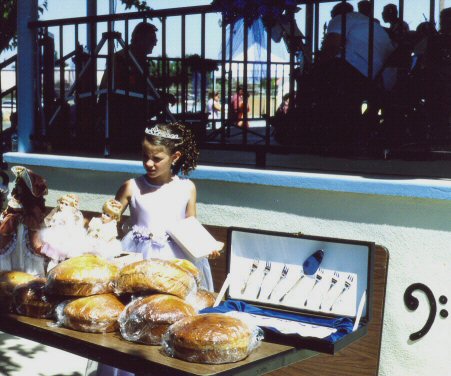
Little queen with massa sovadas [traditional soft sweet egg yeast-bread] at Festa do Emigrante in Tulare, California, 2 May 2004.
– Photo by Carol Fredericks
First, some background on California’s Holy Ghost festas: Portuguese did not begin settling in the Golden State in significant numbers until mid-19th century. The Holy Ghost festival tradition began some years later in Northern California, with small religious gatherings of immigrants in private homes, centered around crowns brought from the Azores. The IDES brotherhood [Irmandade do Divino Espírito Santo] was founded in the late 1800s to organize public Holy Ghost festivals, a movement that spread southward in the early 1900s. As Dr. Eduardo Mayone Dias noted in 2009 in The Portuguese Presence in California:
The initial purpose behind festas was philanthropic, an aspect later rendered largely moot by the Portuguese community’s increasing prosperity. However, a remnant of the original intent occasionally persists, such as when mordomos [marshals] deliver sopas to the homes of shut-ins. In any case, everything is handled in a spirit of cooperation and efficiency, with men and women alike collaborating to prepare and serve the sopas. It is generally a true community effort, hovering to a considerable extent on the fringes of ecclesiastical and fraternal structures. In addition, festas can foster a sense of ethnic self-affirmation, indicative of a person’s degree of social and, especially, economic acculturation. This is illustrated by the opulence of the queens’ capes and vestments, and the competitive spirit displayed during the arrematações [auctions]. Even five or six decades ago, a loaf of massa sovada would command $20 and a fruitcake $60, while more recently a plate of coconut cakes could not be had for less than $100 and bottles of whisky have fetched from $700 to $1,000 at auction. Nowadays, a single afternoon and evening of arrematações can raise as much as $100,000.
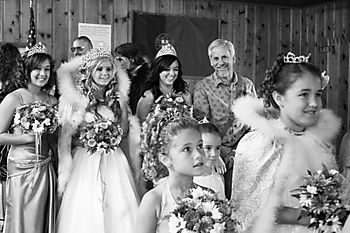
Holy Ghost festival procession in Princeton, California, 29 June 2008.
– Photo by Corey Amaro
Azorean-American expatriate writer and photographer Corey Amaro described the festa in Princeton, California, while visiting her family nearby in the far north of the Sacramento Valley in 2008:
The festa begins with a parade. Tradition has it that a little girl and young woman are both crowned Queen for the day [in honor of 13th century Queen Isabella of Portugal] in thanksgiving to God for hearing her prayers [to keep her people from starving]. The Portuguese people in towns all over the world still continue with this tradition. The crown is carried in the parade by the last year's Queen. The parade begins at the hall and ends at the Church where a mass is said to celebrate the day. During the mass the priest places the crown on those who want a special blessing. The symbolic gestures of having the crown placed on my head makes me feel connected to the tradition of many festas before and to come. The crown is blessed and is carried out by the new Queen.
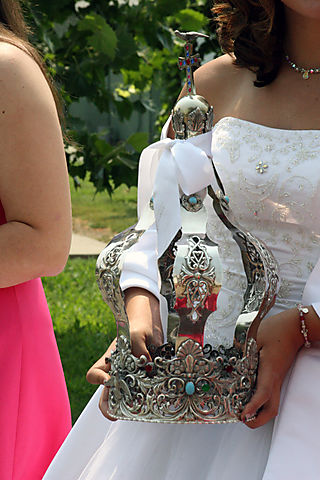
Holy Ghost festival crown in Princeton, California, 29 June 2008.
– Photo by Corey Amaro
Although Vasco is sympathetic to the teenaged queen herself, he depicts a typical Holy Ghost festa and its trappings in a sometimes gently mocking tone. As Dr. Mayone Dias noted, festas can measure acculturation.
Consider the decision to name the title character Nancy. In the late 1990s when Vasco wrote this poem, queens were being drawn from a pool of girls born in the early 1980s, when former California Governor Ronald Reagan was President of the United States. So one might deduce that this girl was named after President Reagan’s wife Nancy, noted for her love of glamorous designer clothes and costly household furnishings. In American pop culture, "Nancy" can also evoke the famous "Nancy Drew" childhood mystery books, or "Nancy Ann Storybook Dolls" from California that were popular in the 1940s and ‘50s. Among the Azorean community it might even bring to mind Ann, nicknamed "Nancy," daughter of the early 19th-century U.S. Consul at Horta, John Bass Dabney – or Vasco's choice could be as basic as the fact that Nancy is an archetypically Anglo girl's given name.
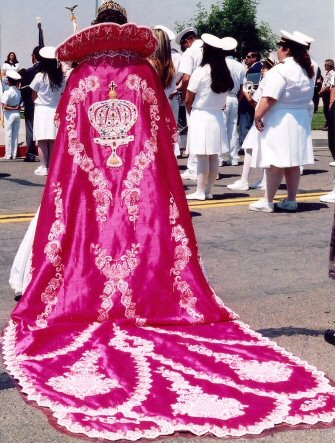
Holy Ghost festival queen cape at Festa do Emigrante in Tulare, California, 1 May 2005.
– Photo by Katharine Baker
The poet paints a vivid portrait of Nancy’s royal regalia, which to his Terceiran eyes are reminiscent of "gaudy movie sets." He notes that modern-day Azoreans immigrate to California in the comfort and speed of jet planes – presumably even Rosa’s family in the previous poem did – implicitly reminding readers what a far cry this is from ship passage in steerage during the first great immigration wave to the U.S., that lasted until 1924. He notes that Nancy is a schoolgirl – significant because earlier in the 20th century, formal education in Portugal was mandatory only until age 9 or 10, whereas Nancy is probably 15 or 16. He petitions the Holy Ghost to make her comfortable despite her tight shoes and heavy vestments, and to afford her cooling breezes – perhaps the wind of the Holy Ghost – to mitigate overheating in inland California’s sweltering summers.
Vasco employs imagery from Greek and Roman mythology twice. In the line "for Nancy is Juno Gæa Mary Venus Maia Ceres," he likens Holy Ghost festa queens to ancient goddesses as well as to the Christian Mary. Each figure represents an important aspect of Azorean-American life, especially in California’s Central Valley, where many Portuguese are engaged in agriculture directly or indirectly: Juno represents marriage and community; Gæa, the Earth; Venus represents love, beauty and fertility; Mary, the predominance of Catholicism among the Portuguese; Maia is growth, and the skies; and, Ceres represents agriculture, especially grains, and the cycle of life and death. In fact, a town in California’s San Joaquin Valley is even named Ceres.
When Vasco intones "Accept that Nancy Queen just for today represents... Eleusis’ secret meanings wakened anew," he is alluding to the Eleusinian Mysteries of Greek mythology – secret yearly initiation rituals held in the Greek town of Eleusis for the cult of Demeter, the Roman goddess Ceres’ Greek predecessor – based on an agrarian cult dating back 3100-3600 years ago, in a major festival that later spread to Rome. Through these mythological references, Vasco is pointing out that concern for family, as well as religious and agricultural values, are universal human themes transcending cultures and time.
Vasco closes by imploring the Holy Ghost "of Whom I am a Brother of Your Fraternity at Desterro" (a small chapel in his native Angra do Heroísmo, Terceira, dedicated to Our Lady of Exiles) to watch over Nancy, so that she will heed the original intent of the festa.
In I No Longer Like Chocolates, his novel of the Azorean emigrant experience, Vasco’s fellow-Terceiran Álamo Oliveira depicts a range of attitudes within California’s Portuguese communities toward various festas and their queens. Central character Joe Sylvia is proud that scarcely five years after his family arrived in the United States, younger daughter Maggie was Tulare’s festa queen, with her ermine-trimmed blue velvet cape lavishly embroidered and beaded in elaborate designs. Yet by a few years later at California’s largest Portuguese festa in Gustine Joe sniffs, "This matter of queens’ capes is pure rubbish," scorning
[the] enormous parade: queens with their attendants, stocky marshals sweating tons of perspiration under new suits festooned with huge diagonal satin sashes bearing their titles, filarmónicas that dazzled with precision marching, banners of associations only nominally philanthropic and of impérios like those back on the island, and flags from the homelands, whether colonial, emotional or adoptive... a mixture of the sacred and the profane.
64 Holy Ghost festival queens at Gustine, California, Festa da Nossa Senhora dos Milagres [Feast of Our Lady of Miracles], 12 Sep 2010. Click on image to view enlargement.
– Photo by Jackson Nichols
Just as Vasco prays for Nancy, "Above all relieve her pinched feet," Álamo lets Joe Sylvia "practically feel the pain of the corns on the Santa Clara queen’s feet, aggravated by her high-heels." By contrast, Joe’s elder daughter and son-in-law deride materialistic one-upsmanship in the hyphenated communities, taking swipes at "the bankruptcies that came from excessive spending, above all on festas or fancy clothes and furniture"; nonetheless "they decided to go to the Gustine festa just to see if the [$5,000] cape of [Cousin] Matias’ daughter was the most beautiful of all."
California poet Lara Gularte, in her 2002 poem Festa do Espirito Santo, recounts the experience of being a side maid twice, and queen once, in the early 1960s. She describes a queen’s hair being curled the old-fashioned way, using rags, and still remembers how sensitive her own scalp was as her mother and grandmother pulled and twisted her hair into those rags. Lara’s grandmother sponsored her, but everything except her dress was borrowed – which, in Lara's memory, is the way it was done back then.
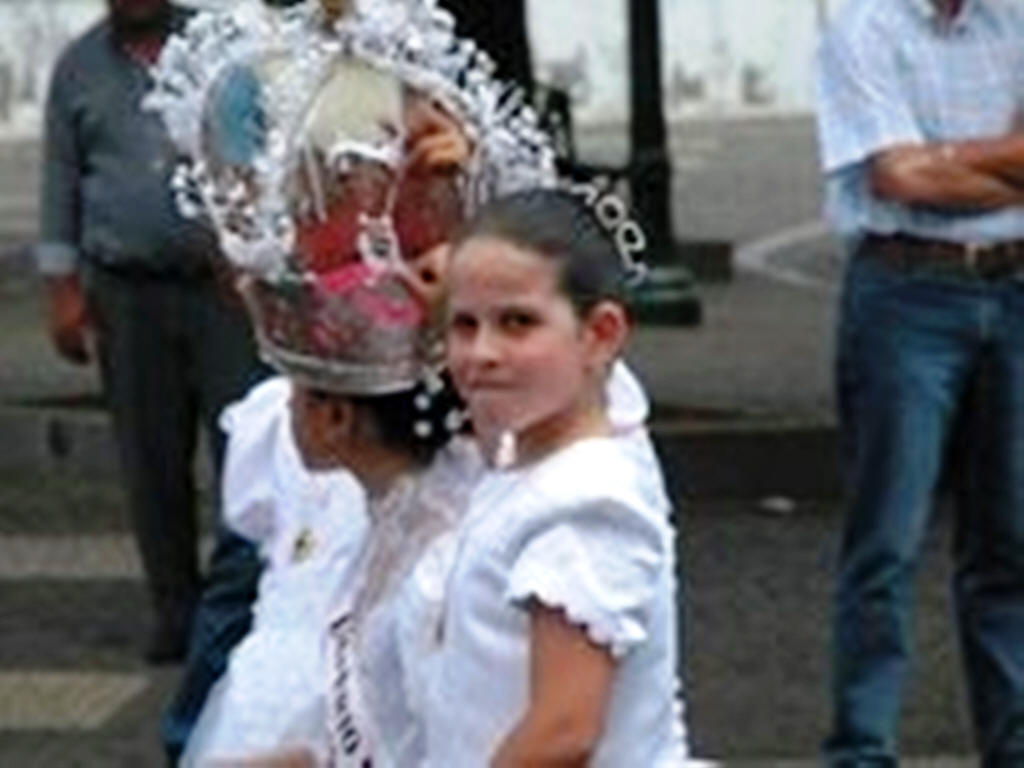
– Photo courtesy Lara Gularte
Nowadays, the Benicia DES’s queen coordinator has proposed a formal solution, namely a virtual cape and dress "closet" whereby regalia "that previous queens or their families would be honored to have a future queen wear" would be listed in a confidential database. Then if a new queen's family lacks the resources to find a cape or cannot get a dress, they could contact her, she would check the virtual "closet" – and voilà! Problem solved, with everything handled discreetly via computer.
The future for California’s more than 100 Holy Ghost festas is still favorable, but their long-term prognosis will hinge on demographics, in view of: a) declining Azorean immigration to the U.S. since the 1980s; b) the economy; and, c) cultural assimilation over future decades leading to some cultural and/or religious unaffiliation, as well as general loss of interest in such labor-intensive endeavors.
On the other hand, four international conferences promoting Holy Ghost festas have been held in the past several years, most recently in June 2010 in San Jose, California, home to a substantial Azorean-American population. More than 300 people from around the world representing 80 organizations attended four days of events, including 33 presentations in addition to an art show, and a cape and crown display – all dedicated, in the words of the conference mission statement, to:
provide participants with a unique blend of academic reflection and practical experience, including the preparation for and the incorporation in the many events of an actual and typical California Holy Ghost festa, the I.E.S. of San Jose celebration.
Such commitment suggests that California’s Queen Nancys are still likely to continue to reign up and down the Golden State for some time to come.
